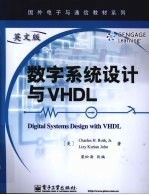

数字系统设计与VHDL 英文版PDF电子书下载
- 电子书积分:14 积分如何计算积分?
- 作 者:(美)罗斯等著
- 出 版 社:北京:电子工业出版社
- 出版年份:2010
- ISBN:9787121108303
- 页数:409 页
Chapter 1 Review of Logic Design Fundamentals 1
1.1 Combinational Logic 1
1.2 Boolean Algebra and Algebraic Simplification 3
1.3 Karnaugh Maps 7
1.4 Designing with NAND and NOR Gates 10
1.5 Hazards in Combinational Circuits 12
1.6 Flip-Flops and Latches 14
1.7 Mealy Sequential Circuit Design 17
1.8 Moore Sequential Circuit Design 25
1.9 Equivalent States and Reduction of State Tables 28
1.10 Sequential Circuit Timing 30
1.11 Tristate Logic and Busses 41
1.12 Problems 42
Chapter 2 Introduction to VHDL 51
2.1 Computer-Aided Design 51
2.2 Hardware Description Languages 54
2.3 VHDL Description of Combinational Circuits 57
2.4 VHDL Modules 61
2.5 Sequential Statements and VHDL Processes 67
2.6 Modeling Flip-Flops Using VHDL Processes 69
2.7 Processes Using Wait Statements 73
2.8 Two Types of VHDL Delays:Transport and Inertial Delays 75
2.9 Compilation,Simulation,and Synthesis of VHDL Code 77
2.10 VHDL Data Types and Operators 82
2.11 Simple Synthesis Examples 84
2.12 VHDL Models for Multiplexers 87
2.13 VHDL Libraries 90
2.14 Modeling Registers and Counters Using VHDL Processes 95
2.15 Behavioral and Structural VHDL 101
2.16 Variables,Signals,and Constants 111
2.17 Arrays 114
2.18 Loops in VHDL 117
2.19 Assert and Report Statements 119
2.20 Problems 122
Chapter 3 Additional Topics in VHDL 137
3.1 VHDL Functions 137
3.2 VHDL Procedures 141
3.3 Attributes 143
3.4 Creating Overloaded Operators 147
3.5 Multi-Valued Logic and Signal Resolution 148
3.6 The IEEE 9-Valued Logic System 153
3.7 SRAM Model Using IEEE 1164 156
3.8 Model for SRAM Read/Write System 158
3.9 Generics 161
3.10 Named Association 162
3.11 Generate Statements 163
3.12 Files and TEXTIO 165
3.13 Problems 169
Chapter 4 Design Examples 177
4.1 BCD to Seven-Segment Display Decoder 178
4.2 A BCD Adder 179
4.3 32-Bit Adders 181
4.4 Traffic Light Controller 188
4.5 State Graphs for Control Circuits 191
4.6 Scoreboard and Controller 192
4.7 Synchronization and Debouncing 195
4.8 A Add-and-Shift Multiplier 197
4.9 Array Multiplier 203
4.10 A Signed Integer/Fraction Muliplier 206
4.11 Keypad Scanner 218
4.12 Binary Dividers 226
4.13 Problems 236
Chapter 5 SM Charts and Microprogramming 247
5.1 State Machine Charts 247
5.2 Derivation of SM Charts 252
5.3 Realization of SM Charts 262
5.4 Implementation of the Dice Game 266
5.5 Problems 271
Chapter 6 Floating-Point Arithmetic 278
6.1 Representation of Floating-Point Numbers 278
6.2 Floating-Point Multiplication 284
6.3 Floating-Point Addition 294
6.4 Other Floating-Point Operations 300
6.5 Problems 301
Chapter 7 Hardware Testing and Design for Testability 306
7.1 Testing Combinational Logic 306
7.2 Testing Sequential Logic 311
7.3 Scan Testing 314
7.4 Boundary Scan 317
7.5 Built-In Self-Test 328
7.6 Problems 339
Chapter 8 Additional Design Examples 345
8.1 Design of a Wristwatch 345
8.2 Memory Timing Models 356
8.3 A Universal Asynchronous Receiver Transmitter 364
8.4 Problems 378
Appendix A VHDL Language Summary 383
Appendix B IEEE Standard Libraries 391
Appendix C TEXTIO Package 393
Appendix D Projects 395
References 406
- 《管理信息系统习题集》郭晓军 2016
- 《指向核心素养 北京十一学校名师教学设计 英语 七年级 上 配人教版》周志英总主编 2019
- 《数字影视特效制作技法解析》王文瑞著 2019
- 《信息系统安全技术管理策略 信息安全经济学视角》赵柳榕著 2020
- 《设计十六日 国内外美术院校报考攻略》沈海泯著 2018
- 《卓有成效的管理者 中英文双语版》(美)彼得·德鲁克许是祥译;那国毅审校 2019
- 《计算机辅助平面设计》吴轶博主编 2019
- 《高校转型发展系列教材 素描基础与设计》施猛责任编辑;(中国)魏伏一,徐红 2019
- 《景观艺术设计》林春水,马俊 2019
- 《高等教育双机械基础课程系列教材 高等学校教材 机械设计课程设计手册 第5版》吴宗泽,罗圣国,高志,李威 2018
- 《断陷湖盆比较沉积学与油气储层》赵永胜等著 1996
- 《SQL与关系数据库理论》(美)戴特(C.J.Date) 2019
- 《魔法销售台词》(美)埃尔默·惠勒著 2019
- 《看漫画学钢琴 技巧 3》高宁译;(日)川崎美雪 2019
- 《优势谈判 15周年经典版》(美)罗杰·道森 2018
- 《可汗解梦》俄罗斯领航Pilot动画公司 2017
- 《社会学与人类生活 社会问题解析 第11版》(美)James M. Henslin(詹姆斯·M. 汉斯林) 2019
- 《海明威书信集:1917-1961 下》(美)海明威(Ernest Hemingway)著;潘小松译 2019
- 《迁徙 默温自选诗集 上》(美)W.S.默温著;伽禾译 2020
- 《上帝的孤独者 下 托马斯·沃尔夫短篇小说集》(美)托马斯·沃尔夫著;刘积源译 2017
- 《电子测量与仪器》人力资源和社会保障部教材办公室组织编写 2009
- 《少儿电子琴入门教程 双色图解版》灌木文化 2019
- 《指向核心素养 北京十一学校名师教学设计 英语 七年级 上 配人教版》周志英总主编 2019
- 《北京生态环境保护》《北京环境保护丛书》编委会编著 2018
- 《指向核心素养 北京十一学校名师教学设计 英语 九年级 上 配人教版》周志英总主编 2019
- 《通信电子电路原理及仿真设计》叶建芳 2019
- 《高等院校旅游专业系列教材 旅游企业岗位培训系列教材 新编北京导游英语》杨昆,鄢莉,谭明华 2019
- 《电子应用技术项目教程 第3版》王彰云 2019
- 《中国十大出版家》王震,贺越明著 1991
- 《近代民营出版机构的英语函授教育 以“商务、中华、开明”函授学校为个案 1915年-1946年版》丁伟 2017
